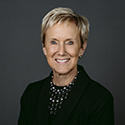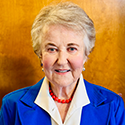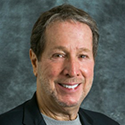
While governing boards need to be open to input and recommendations from their college, foundation, or system’s stakeholders, they must also discern between what’s appropriate and what could compromise their independence and their institution’s mission and integrity.
That’s especially important these days, as political polarization is increasingly creating challenges for board members in fulfilling their fiduciary duties of loyalty, obedience, and care. AGB released a Board of Directors’ Statement on Influences Impacting Governing Board Independence and Leadership in late 2023 to guide boards in the governance of their colleges, foundations, and systems; inform them of their roles and responsibilities; and clarify their relationships with those involved in the governance process.
In part one of this two-part podcast, AGB Interim President and CEO Ellen Chaffee speaks with two people who serve as AGB senior consultants and senior fellows: Jill Derby, who previously was chair of the Nevada Board of Regents and is the current chair of the American University of Iraq in Kurdistan, and David Maxwell, president emeritus of Drake University and board member and former board chair at Grinnell College.
Ellen, Jill, and David will explore the challenges faced by governing boards in upholding their fiduciary duty amid increasing external pressures, as well as highlight the importance of maintaining board independence and protecting institutions from any undue influences.
Aired: January 31, 2024
Opinions expressed in AGB podcasts are those of the speakers and not necessarily those of the organizations that employ them or of AGB.
Click to Read the Podcast Transcript
Introduction:
Welcome to the Trusteeship Podcast from AGB, the Association of Governing Boards. We cover everything higher education leaders need to know about the challenges facing our nation’s colleges and universities. More important, we provide the facts and insight you need to solve those challenges and to be the storytellers and advocates higher education needs.
While governing boards need to be open to input and recommendations from their college, foundation, or system’s stakeholders, they must also discern between what’s appropriate and what could compromise their independence and their institution’s mission and integrity.
That’s especially important these days, as political polarization is increasingly creating challenges for board members in fulfilling their fiduciary duties of loyalty, obedience, and care. AGB released a Board of Directors’ Statement on Influences Impacting Governing Board Independence and Leadership in late 2023 to guide boards in the governance of their colleges, foundations, and systems; inform them of their roles and responsibilities; and clarify their relationships with those involved in the governance process.
In part one of this two-part podcast, AGB Interim President and CEO Ellen Chaffee speaks with two people who serve as AGB senior consultants and senior fellows: Jill Derby, who previously was chair of the Nevada Board of Regents and is the current chair of the American University of Iraq in Kurdistan, and David Maxwell, president emeritus of Drake University and board member and former board chair at Grinnell College.
Ellen, Jill, and David will explore the challenges faced by governing boards in upholding their fiduciary duty amid increasing external pressures, as well as highlight the importance of maintaining board independence and protecting institutions from any undue influences.
Ellen Chaffee:
Thank you for joining us today. Governing boards have increasing difficulty pursuing their organization’s best interests, as their fiduciary duty of loyalty, obedience, and care requires. In calmer times, boards and presidents had more positive challenges than negative ones, and higher education was highly valued in society. It was easier to be a good fiduciary.
But many of the upward trends have started going down, and people looking at colleges and universities are thinking that something should change. Board members knew that they needed to listen and respond to different constituencies, but what if a prudent fiduciary response would be to say no to a prospective major donor or a powerful legislator? What would saying no cost the institution?
Every board sometimes hears from influencers who have a bad idea or an idea that just happens to benefit them more than the organization. That’s okay. The influencer is not the problem, not even high stakes’ undue influence. The problem, and it’s a huge one, is the board that allows influence to divert attention away from the mission or strategic plan or to weaken the organization’s core strengths. Every institutional accrediting agency requires board independence, because only an independent board will recognize undue influence and ensure that nothing will sabotage the best interests of the institution.
To help boards deal with ideas that are based on self-interest or the interest of something other than the institution, in late 2023, AGB’s board of directors released a statement on influences that threaten board independence.
This new statement focuses on difficult fiduciary decisions, preparing for those decisions, identifying where to draw the line, and how to reduce the possibility that they will even arise.
I have with me Jill Derby and David Maxwell, two very seasoned former board members or current board members and presidents. We’re going to address some questions together, and the first one that I want to raise, Jill, is I know you’ve had some powerful experiences with this kind of situation. Can you give us some examples?
Jill Derby:
Thank you, Ellen. Yes, I think it’s very helpful to our audience, to trustees, to know of specific examples so they see clearly. We need to make clear what inappropriate intrusion looks like. We’re living in a time of unprecedented political and ideological intrusion into our colleges and universities, what they teach, how they teach. And I think to make it clear to trustees what’s at stake is what we need to do, because I think we underestimate what trustees, certainly the public, but what our governing boards understand about their fiduciary role and what inappropriate intrusion looks like.
So let me give you a couple examples from my long history as being a board chair and being a member, first of a board of regents of a state-wide system of education with a individual institution. I was on a search committee and we were in the process of identifying, electing the new chancellor for the system. It was the final meeting of our search committee in which we were deciding between two or three candidates, that were the finalists. We’d taken all the input from and a regent colleague of my mine’s phone rang and it was the governor.
And we heard her say, “Yes, sir,” and listened very politely, and acknowledged the importance of our relationship with the state government, and say all sorts of positive things about welcoming, always welcoming the input and that she would deliver his opinion to the search committee that was about to make its decision.
She turned, she hung up. She told us what the governor had said. We continued to deliberate and ended up appointing the other candidate and not the governor’s choice. This was probably more than 15 years ago. It was in an earlier time when there wasn’t the degree of political interference that there is now, and the governor seemed to understand that it was the board’s rightful authority to make the choice about who to hire for leadership positions in the administration of the system. The governor was unhappy and he let a few people know that. But other than that, he respected the board’s authority.
It feels like a good example of the way it should go. We know that in the last few years, there’ve been examples of that same dynamic of a governor, identifying who, in this case, he wanted and the board essentially caving to that request.
The other example that I would use, that is really quite relevant relates to my position as board chair, at the American University of Iraqi Kurdistan. There are more than 70 American universities in different countries. And in all these countries, the Ministry of Education is the final governing authority. So having governing boards that have independent authority is a very different kind of concept, particularly in countries that don’t have a tradition, a deep tradition of democracy. And I can’t tell you, the number of times, but it’s certainly more than a handful when the president calls, said we need to call an emergency session of the board. The ministry has requested or demanded really that we change our admission policies. Let’s take the example in a certain way.
That board members have the stature in their communities, in their countries, to really make the case, that a president alone can’t. And the partnership with the president is so important to. So in that meeting, it was very clear that board members, that themselves, are citizens in, up in Kurdistan, they’re Kurdish citizens. Members of the board went with the president, to the ministry, to make the case, and successfully made the case. It was a negotiation. It always involves a kind of negotiation. But in the end, the university protected its autonomy, its right to make decisions about its curriculum and its admission procedures.
And once again, it was the board. So I think both of those illustrate whose responsibility it is.
Ellen Chaffee:
Thank you, Jill. Can you, can you imagine what might have happened, otherwise, in each of those cases?
Jill Derby:
Well, in, in both cases, it, it’s, sometimes it’s one step leads to another the precedent of the governor getting to say who, instead of the board of regents could be a slippery slope, for one thing. But it’s really the whole concept that many board members I think don’t understand, that the system in America, of citizen trustees, as the governance authority was designed by our forefathers to keep the government’s hands off of what’s taught, who should teach, who, the students are, all those issues.
And I think once that principle is violated, it becomes easier to violate again. But I continue to believe that the principle itself isn’t well understood. It’s taking the stand that’s so critical in helping our trustees understand what’s at stake if they fail in their fiduciary responsibility, to protect the independence, because that is so central to American higher education. It’s so central to the role that our colleges, universities play in our whole society in advancing democracy, advancing the ability of our students to learn in a diverse environment and be able to think critically about contemporary issues.
Ellen Chaffee:
Thank you, Jill. What things is it okay for the board to yield to external influence on? Do they need to retain authority for what athletic conference the teams are in or, whether they’re going to expand the Office of Student Affairs? So where’s the line or what are the lines that board members should keep in mind?
Jill Derby:
Well, let me offer something and I’m sure David can weigh in there too. It’s one of the challenges of being a university or college trustee is that you have to discern. It’s very important that you take input. When the governor called, our search committee the chair listened and listened, it was probably at least a 10-minute conversation, acknowledged the importance of the partnership, the importance of listening to the opinion of those in state government. And you can expand that to other external constituencies because universities have many, as well as internal constituencies.
But knowing what will violate the integrity and the important independence and authority of the board is the line that has to be distinguished. And I think that’s one where AGB can play a critical role in pointing to instances that are appropriate and that aren’t. Influence is always there, but the university must maintain the authority around its programs, its curriculum, and its academic freedom to design those according to its mission. It has to relate to the mission, and that’s maybe the border. David, I bet you can add to that.
David Maxwell:
Other than the fact that I agree. You know, there are actually two dividing lines, and is as we talk about external influence and external influence and attempts at influence on the board, and then, Ellen, to use your examples about an athletic conference or should we, should we expand the Office of Student Affairs? The latter question is would be a board stepping over the line into management? Right?
Ellen Chaffee:
Right.
David Maxwell:
The board has the right to say, “Where’s the money coming from to do that?” Because they have to approve the budget. I think in this conversation, sort of these three tiers of input, of external, the board, and then the management of the institution.
Ellen Chaffee:
That’s right. And of the things I want to point out is that, associated with the board statement on this subject are a number of, we call them tools for boards to use in discerning, some of the things we’ve talking about. Are you ready to deal with inappropriate influence? And how to work with people so that you catch them before they step over the line or get overly concerned?
David, what, what do we risk losing or what, what have we lost already, do you think? Because this is exponentially growing, certainly on the political side, also on the donor side. We see this, all too often.
David Maxwell:
Let me start with the macro scale. And, you know, Ellen, you, Jill, and I were part of the advisory group that worked on the board statement. And our starting point in that conversation was really four basic assumptions. One is that the integrity and quality of higher education is essential to the health of a civil democracy. Right? We prepare citizens for participatory democracy. We prepare the workforce. We advance knowledge, the health of our ability of what we do.
The second assumption is that institutional autonomy and academic freedom are essential to the health and vitality of higher ed, and our ability to serve our social purpose. The third is that institutional autonomy and academic freedom, as you’ve given examples, are under assault. They’re under assault by politicians, by donors. And finally–and this is what really is the heart of the statement–is that trustees have a sacred and increasingly difficult fiduciary responsibility to protect their institutions from this assault.
And so I think that’s the macro response to this. And I think that there’s a great deal of concern now in the higher education community that, you know, for those of us who’ve been around higher ed for a long time, this may be the scariest time of all. Certainly in my 50-plus years in higher ed, in terms of this assault.
In our more specific terms, we’ve already seen some of the impacts that you both have mentioned—the distortion of curricula, of course content, student groups that are prohibited from meeting on campuses, prohibiting or encouraging various kinds of speakers on campus with people trying to impose their own orthodoxy on the campus. And one of the tragic ironies of imposing any kind of orthodoxy is that, as you well know, the critical nature of having diverse thought and perspectives at institutions.
I’ve always said that it’s important for students particularly to understand that complex problems rarely have one right answer. Right? That the world is complicated. And the right answers really, in many cases, are dependent on what your basic assumptions are and what perspectives you bring to the problem. And so in ensuring that, on our campuses, we have diversity of thought and representation of diversity of thought. And now we’re seeing what appears to be, particularly in the last couple of weeks, a sustained assault on higher ed by members of Congress, and their ideological allies.
So when I say this may be the scariest time yet in my 53 years in higher ed, that’s one of the things that I’m referring to. But we also see from the Gallup Polls that– and I think it’s related to this assault—that we’re losing the respect and appreciation for the role of higher ed, among the general public. And I think that’s a serious concern as well. And I do think it’s related to these external attempts to influence who we are and, and what we’re doing.
Ellen Chaffee:
Could not agree more. Jill?
Jill Derby:
Let me weigh in because David pointed to something that I think is very important. Over the last year or two, there have been hundreds of attempts in state legislatures to pass legislation directly attacking the concept of DEI or diversity, equity, and inclusion. That’s part of what’s going on in society, the political polarization, we have ideological pushback over teaching certain, theories and concepts around history, for example. And what I think we need to make clear is the universities stand, and across the country we’ve seen this, universities have really taken on the effort to become more diverse environments.
And even though it’s partly about fairness, it’s very much about a healthy learning environment and what David pointed to, that a healthy learning environment involves the diversity of thought that comes from a diversity of people. And our students will graduate into a diverse environment. And better while they’re on campus they have that opportunity to grow and listen to diverse thoughts from diverse pe- from a diverse student body. So when universities stand up and say, “No, we’re against these political efforts to control the students we have and what we teach and limit our efforts to advocate an advanced diversity on our campuses,” it’s central to the mission of universities and colleges to have a healthy learning environment that offers diverse thought from diverse people.
And I think one of the most alarming things to me have been just the volume of bills across the country that have come in attacking university and college efforts to advance, whether that’s in a diversity effort, office, whether that’s in a diversity office, whether that’s in, training efforts that is, that in welcoming students of diverse backgrounds. All of that really is part of a healthy learning environment, which is central to the mission of our universities.
So I wanted to say that, and maybe make a separate point in helping trustees across the country frame this. I think framing it in terms of risk management is a great strategy. Boards understand, or they need to understand, that risk management is central to their role in universities, as fiduciaries as looking out to the future, as ensuring economic stability into the future. That’s one of their key roles. So risk management, particularly more recently, has become a way of framing that. Helping boards understand, this is your responsibility. These are the things you need to look at when you’re looking at the landscape of what risks there are.
I think that helps them understand how clearly it is their responsibility to protect academic freedom, to protect the university’s right in terms of what it teaches and who it teaches to the demographics of its student community.
Ellen Chaffee:
David? One of the realizations that came to me as, as we got into this over the last several years is the relationship between what we’re talking about and the very idea of democracy, and the maintenance of our republic, as our government. It is so ingrained in so many of us and we so take for granted the ability to vote against someone who has a lot of power, or to speak our minds. And if we’re curious about something that’s maybe unpopular, we can still read about it. We can still talk about it and think about it.
But in some of the legislation that you’re describing, Jill, and, and in other venues, well, in Congress, clearly, one of the possibly intended consequences is that faculty members and administrators are alerted that there is rough territory here, and very often may self-sensor to, because they don’t want to risk being called out, even by someone in the class, it could be and sometimes is. And so even when those laws don’t pass, they get in the way of learning and of free speech and if we can’t disagree with each other civilly, we can’t continue to have a democracy.
And one of the things that I’m hoping boards will do is quite consciously model for the rest of the campus and, and the community, how to think critically, how to be respectful, how to have that civil dialogue, because that’s one of their important teaching roles.
David Maxwell:
Ellen, to that point, one of the things that I’ve said in my consulting practice, through AGB, to boards and, and in my time on the, the Grinnell College board is that, that we as a board need to look like and act like what we say the institution is and wants to be, that, that we have to model everything that we say or the values and aspirations of the institution.
Jill Derby:
Ellen, I would add in another concrete example if I may, to this, and that is what I was told by a fellow AGB colleague. And doing a consulting assignment that was working at governance, board development, and the issues that AGB is always advocating, and giving it in a particular state, and I’m going to say Florida, where there’s been a lot of, political intrusion into higher education that’s been well-publicized. It really is a political agenda there, and where we as consultants know usually, there’s a dialogue and a lot of spirited, interactive, questions and answers and ideas that come forward.
And she said to me that nobody spoke because the meeting was being recorded and they were intimidated from saying anything. I think we need to call that out and say, “This is what’s happening in higher education.” And this is a serious infringement on academic freedom, academic thought, that the very people that hold that as sacred themselves, are faculty and college and university administrators are intimidated, are muted by political forces that can impact, their positions.
And so I just want to call that specific example of what we’re talking about here in terms of the whole environment, and once again, how important it is. Trustees are the people, boards are the group that can push back, that can stand up, that can say, “Wait a minute,” and make clear what’s at stake in the kind of intrusion, and what is the impact of it, and how that really undermines the mission across the country of our colleges and universities.
Ellen Chaffee:
One of our headlines on the AGB website today is, “The fate of higher education depends on consequential board governance.” And I think that’s absolutely true. Boards need to understand their authority and they need to uphold their authority and not cede it to anyone else by silence or by diversion of fiduciary duty. And that’s where the whole courage piece comes in.
What kind of country is this, what kind of democracy is this if it takes courage to give your opinion about something?
Closing:
Thank you for joining us for part one of this conversation – in part two, Ellen, Jill and David explore courageous leadership, steps boards can take to put fiduciary duty first, and the importance of board education.
Speakers

Ellen Chaffee, PhD
Interim President and CEO, AGB
Ellen Chaffee’s distinguished career spans institutional, system, policy, and national professional leadership in both public and private higher education. As a past president of two universities and two national professional associations, she has led executive, academic affairs, student affairs, research, and equal-opportunity areas. She has also served on and consulted with numerous governing boards as well as advised foundations and nonprofit national organizations in the fields of higher education research, health care, and allied health. In addition, she has conducted extensive research and written numerous publications on management, decision-making, and other topics in higher education.

Jill Derby, PhD
Senior Fellow and Senior Consultant, AGB
Jill Derby has more than 30 years’ experience working nationally and internationally in higher education governance. She is the former board chair of the Nevada System of Higher Education, an eight-institution state system, and now serves as board chair of the American University of Iraq, Sulaimani in Kurdistan.

David Maxwell, PhD
Senior Fellow and Senior Consultant, AGB
David Maxwell is a former chair and current member of the board of Grinnell College. He served as president of Drake University from 1999 to 2015, and upon his retirement, the Drake Board of Trustees awarded him the title of President Emeritus. Previously, he was director of the National Foreign Language Center in Washington, D.C., and president of Whitman College.
RELATED RESOURCES

Trusteeship Magazine Article
United We Stand: An Urgent Call for Leadership

Trusteeship Magazine Article
Send in the Guardians

